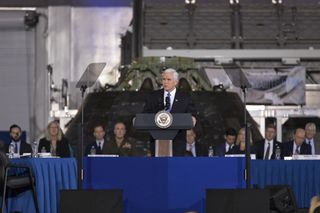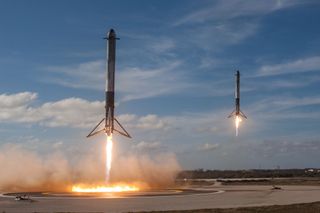SpaceX Gets a Shout-Out from Vice President Pence for Falcon Heavy Success
The successful debut of SpaceX's huge Falcon Heavy rocket earlier this month has drawn yet more kudos from the Trump administration.
Shortly after the Falcon Heavy lifted off on Feb. 6, sending SpaceX CEO Elon Musk's Tesla Roadster into the great beyond, President Donald Trump tweeted a hearty congratulations. And Wednesday (Feb. 21), during the second-ever meeting of the newly reconstituted National Space Council (NSC), Vice President Mike Pence gave the company a shout-out as well.
"And, of course, just a couple of weeks ago, the world watched with wonder as the Falcon Heavy blasted off from this very shoreline, and then moments later sent two of its boosters sailing back down to Earth, where they landed side by side, intact, less than a mile from where they'd lifted off," Pence said at the meeting, which was held at NASA's Kennedy Space Center in Florida. (The Heavy launched from KSC's historic Pad 39A, which once hosted space shuttle and Apollo moon mission liftoffs.) [In Photos: SpaceX's 1st Falcon Heavy Rocket Test Launch Success!]
"Very impressive indeed," added Pence, who chairs the NSC.

As Pence noted, two of the Falcon Heavy's three first-stage boosters came back to Earth for successful touchdowns on Feb. 6. The third — the big rocket's core booster — ran out of ignition fluid and crashed in the ocean just 330 feet (100 meters) from its floating landing platform, a drone ship called "Of Course I Still Love You," Musk said last week.
Pence mentioned the Falcon Heavy launch to help highlight the role that private enterprise can play in advancing the United States' goals in spaceflight and exploration.
Get the Space.com Newsletter
Breaking space news, the latest updates on rocket launches, skywatching events and more!

"The evidence is clear: While the government can blaze new trails into exploring the outer expanse of space, like all frontiers, ultimately that will be settled by the dreams of our people, by the brilliance of our innovators, the energy of entrepreneurs and the daring of our explorers together," he said.
The NSC will work to streamline regulations for private spaceflight, making it easier for companies such as SpaceX to get things done, Pence stressed.
On Tuesday (Feb. 20), Pence announced the 29 nominees for the NSC's Users' Advisory Group, which will work with the council to help shape the nation's space policy. SpaceX President and Chief Operating Officer Gwynne Shotwell is on the list, as are Apollo 11 moonwalker Buzz Aldrin, former Speaker of the House Newt Gingrich and a number of other notable names.
The nominees await official confirmation by the head of NASA. (The agency is currently led by Acting Administrator Robert Lightfoot; Trump's nominee to lead NASA, former Oklahoma congressman Jim Bridenstine, has not yet been confirmed by Congress.)
Musk briefly served on one of Trump's advisory councils last year, but the SpaceX CEO quit after Trump pulled the U.S. out of the Paris Climate Accord.
Oh, and about Musk's Tesla: It's zooming around the sun on an elliptical orbit that takes it out beyond Mars at its most distant point and back to Earth's path at its closest. The car and its driver, a dummy named Starman, will likely smash into Venus or Earth sometime in the next 10 million years or so, researchers have calculated.
Follow Mike Wall on Twitter @michaeldwall and Google+. Follow us @Spacedotcom, Facebook or Google+. Originally published on Space.com.
Join our Space Forums to keep talking space on the latest missions, night sky and more! And if you have a news tip, correction or comment, let us know at: community@space.com.

Michael Wall is a Senior Space Writer with Space.com and joined the team in 2010. He primarily covers exoplanets, spaceflight and military space, but has been known to dabble in the space art beat. His book about the search for alien life, "Out There," was published on Nov. 13, 2018. Before becoming a science writer, Michael worked as a herpetologist and wildlife biologist. He has a Ph.D. in evolutionary biology from the University of Sydney, Australia, a bachelor's degree from the University of Arizona, and a graduate certificate in science writing from the University of California, Santa Cruz. To find out what his latest project is, you can follow Michael on Twitter.
